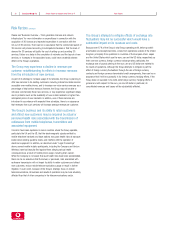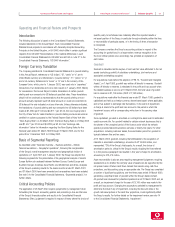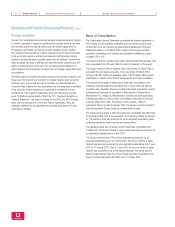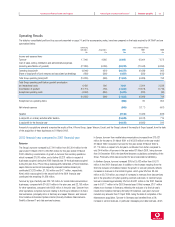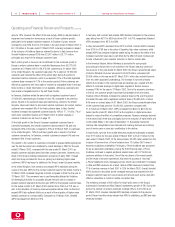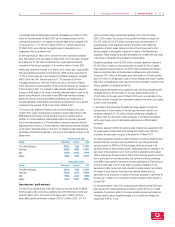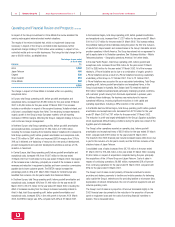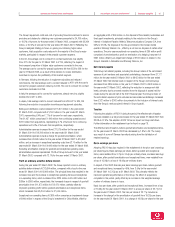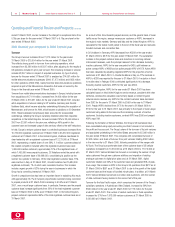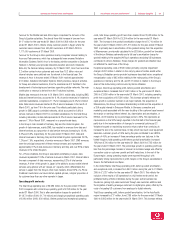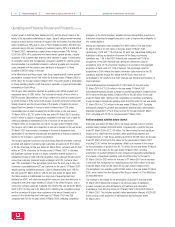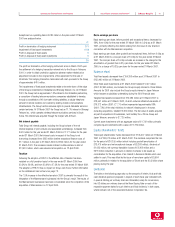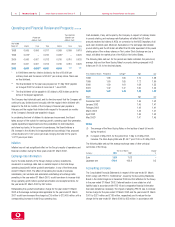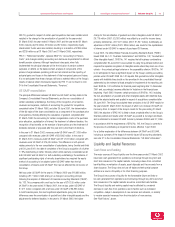Vodafone 2002 Annual Report Download - page 42
Download and view the complete annual report
Please find page 42 of the 2002 Vodafone annual report below. You can navigate through the pages in the report by either clicking on the pages listed below, or by using the keyword search tool below to find specific information within the annual report.
Vodafone Group Plc Annual Report & Accounts and Form 20-F Operating and Financial Review and Prospects40
Operating and Financial Review and Prospects continued
organic growth in Australia, New Zealand and Fiji, and the Group’s share of the
results of its associated undertakings in Japan. Japan’s cellular market remained
robust as mobile services continued to expand, with the number of mobile phone
users increasing by 19% year on year. J-Phone Vodafone added 1,859,000 new
customers during the year, increasing its customer base by 23% to 9,966,000 at
31 March 2001, representing a market share of approximately 16%. Almost
6,200,000 (62%) of its customers now have internet-capable phones, a higher
proportion of its customer base than any other operator in Japan. A combination
of competitor activity and the Japanese consumers’ appetite for internet-access
phones resulted in a substantial increase in customer upgrade and connection
costs compared with the previous year, leading to a decrease in J-Phone
Vodafone’s EBITDA margin in the year.
In the Middle East and Africa region, total Group operating profit, before goodwill
amortisation, increased from £148 million for the year ended 31 March 2000 to
£213 million for the year ended 31 March 2001. This profit growth is attributable
to strong operating results in both the Group’s subsidiary in Egypt and associated
undertaking in South Africa.
The Group’s other operations reported an operating loss, before goodwill and
exceptional items, of £281 million. This includes the results of Arcor, which is
EBITDA positive, Telecommerce, the Group’s share of the start-up losses incurred
by Vizzavi Europe, a 50% owned multi-access consumer portal joint venture with
Vivendi Universal, and the Group’s share of the results of Cegetel, the second
largest fixed line operator in France in which Vodafone has a 15% stake.
Consolidated cost of sales increased from £4,359 million in the year ended
31 March 2000 to £8,702 million in the year ended 31 March 2001, including
£4,851 million in respect of acquisitions completed in the year. Cost of sales for
continuing operations represented 58.0% of turnover for the year ended
31 March 2001, an increase from 55.4% for the year ended 31 March 2000.
The Group’s cost of sales as a proportion of turnover increased in the year ended
31 March 2001 due primarily to increases in the level of equipment costs,
depreciation of the network infrastructure and payments of financial incentives in
relation to the increase in customer connections.
The Group’s equipment costs and cost of providing financial incentives to service
providers and dealers for obtaining new customers amounted to £1,853 million,
or 23.5% of turnover, for the year ended 31 March 2000, compared with £3,364
million, or 22.4% of turnover for the year ended 31 March 2001. In Germany,
the significant customer growth in a highly competitive market resulted in a
substantial increase in total customer acquisition costs, although blended cost to
connect per customer remained largely unchanged at 1116. Customer churn
was 11%, a decrease of four percentage points from the prior year. In Italy, net
connection costs stabilised at 137 per customer for the year to 31 March 2001
despite growing competitive pressures. Churn increased slightly from 13% for
the year ended 31 March 2000 to 14% for the year ended 31 March 2001.
The Italian market is characterised by a high level of prepaid product and
relatively low ARPU, with customer acquisition costs and churn also being low in
comparison with other major markets in Europe. In the United Kingdom, cost to
connect for contract customers increased from £94 for the year ended 31 March
2000 to £121 for the year to 31 March 2001, reflecting the competitive market
and the connection of higher value customers in the period. Prepaid cost to
connect in the United Kingdom for the year to 31 March 2001 was £56
compared with £50 for the year ended 31 March 2000, reflecting competitive
pressures. In the United Kingdom, Vodafone announced significant reductions in
distribution incentives for prepaid products in order to improve the profitability of
this market segment.
Selling and distribution costs increased from £869 million in the year ended
31 March 2000 to £1,162 million in the year ended 31 March 2001,
representing 11.0% and 7.7% of turnover for each year, respectively. Selling and
distribution costs as a proportion of turnover for the Group’s continuing
operations was 7.4% in the 2001 financial year, compared with 8.0% for
acquisitions. In the 2000 financial year, selling and distribution costs for
acquisitions were 16.7% of turnover, resulting in an increase in the aggregate
proportion of these costs to 11.0% of turnover. The percentage result for
acquisitions in 2000 reflects the higher connection costs incurred by the US
operations acquired through the merger with AirTouch, which are not
consolidated in the results for the 2001 financial year following the formation of
Verizon Wireless.
Administrative expenses increased from £1,664 million for the year ended
31 March 2000 to £11,579 million in the year ended 31 March 2001.
Administrative expenses include a charge for goodwill amortisation increasing from
£674 million for the year ended 31 March 2000 to £9,585 million for the year
ended 31 March 2001, relating to the consolidation of subsidiary undertakings,
and an increase in exceptional operating costs from £30 million for the year ended
31 March 2000 to £176 million for the year ended 31 March 2001. Excluding
amortisation charges for goodwill and exceptional operating costs, administrative
expenses represented 12.1% of Group turnover for the year ended 31 March
2001, compared with 12.2% for the year ended 31 March 2000.
Profit on ordinary activities before interest
During the year ended 31 March 2001, the Group reported a loss on ordinary
activities before interest of £6,909 million, compared with a profit for the year
ended 31 March 2000 of £1,752 million. The items having the most significant
impact on this result were the increase, before goodwill amortisation and
exceptional items, in total Group operating profit from £2,538 million for the year
ended 31 March 2000 to £5,204 million for the year ended 31 March 2001,
including £2,087 million from acquisitions, offset by an increase in the charge
for the amortisation of goodwill from £1,710 million for the year ended 31 March
2000 to £11,873 million for the year ended 31 March 2001, including
amortisation of goodwill attributed to joint ventures and associated undertakings,
an increase in exceptional operating costs from £30 million for the year to
31 March 2000 to £320 million for the year to 31 March 2001 and a decrease
in the profit from exceptional non-operating items from £954 million in the year
ended 31 March 2000 to £80 million for the year ended 31 March 2001.
The exceptional, non-operating profit of £954 million in the year ended 31 March
2000, arose mainly from the disposal of the Group’s interest in E-Plus Mobilfunk,
as described below.
The increase in the charge for the amortisation of goodwill in the year ended
31 March 2001 reflects the increase in the net book value of capitalised
goodwill, including amounts attributed to joint ventures and associated
undertakings, from £40,453 million at 31 March 2000 to £125,808 million at
31 March 2001. This includes goodwill, before amortisation charges, of £83,028
million arising on the acquisition of Mannesmann during the year ended
31 March 2001.


